VET APPROVED

The information is current and up-to-date in accordance with the latest veterinarian research.
Learn more »Click to Skip Ahead
Although we might not think about it often, our cats’ teeth have a lot in common with our own, especially when it comes to the importance of dental care. If you don’t keep your cat’s teeth clean, they can develop serious dental issues. Regular oral check-ups and professional cleanings help prevent dental disease and allow vets to reach areas you might miss at home. These procedures also remove built-up tartar using special equipment that isn’t available for at-home use.
We know that taking your cat in for a professional dental cleaning can seem expensive or unnecessary, but in this article, we’ll explain how much it actually costs and why it could be essential for your cat’s long-term health.
The Importance of Dental Health for Felines
Brushing your cat’s teeth or having them professionally cleaned is something that we as pet owners often overlook. Still, it’s a vital part of a cat’s overall health. Cats can’t pick up a toothbrush and do the work themselves. They rely on their owners to clean their teeth and help prevent plaque and tartar buildup.
Take a look at your cat’s teeth. If you notice any tartar buildup, then getting their teeth cleaned becomes even more vital. Plaque on their teeth eventually turns into tartar, which is hard and yellow and difficult to remove. If the tartar sits on their gum line, this is when more serious problems start to arise.
Dental disease can happen to cats of all ages, yet almost 85% of cats that are over the age of 3 have some sort of dental disease. Not only are these numbers outrageous, but it goes to show that humans are not taking the problem as seriously as they should. Over time, the lack of hygiene could cause tooth loss and jawline decay, as well as issues with their heart and lungs.
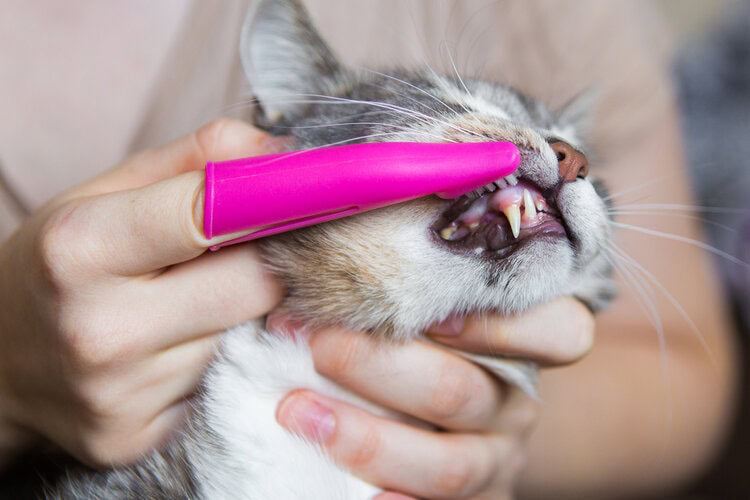
How Much Does a Professional Cat Teeth Cleaning Cost?
Coming up with a concrete price for professional cat dental cleanings isn’t easy. There are quite a few components that affect the price. Without factoring these in, most people can expect to pay between $200 and $1,000 for a dental cleaning without teeth extractions.
Location
Where you live is one of the most significant determining factors of dental cleaning costs. You’re likely going to see a big jump in price if you go to a veterinarian in an urban area compared to a rural one. Urban veterinarians could charge upwards of a few hundred dollars, while you might only have to pay a couple of hundred dollars or less at a rural location. However, even these prices aren’t guaranteed because each office sets its own prices.
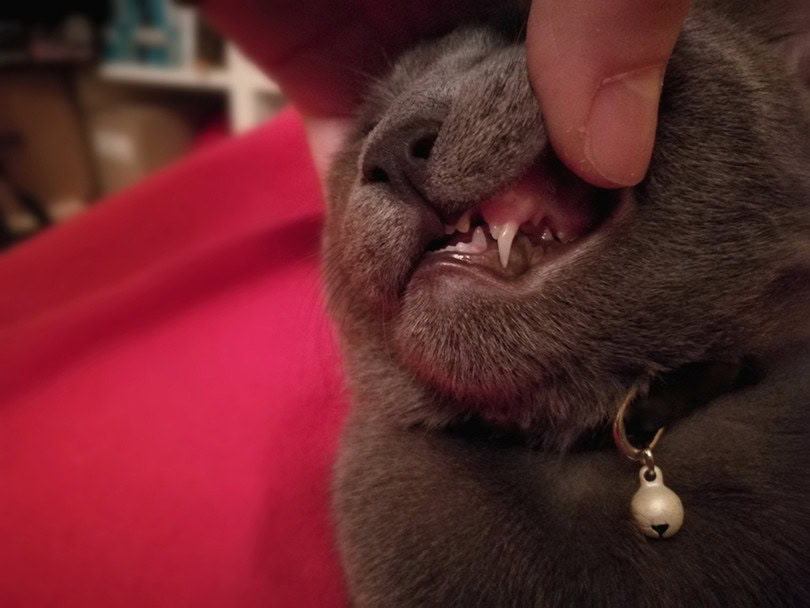
Age
The older a cat gets, the more tartar and teeth damage they are likely to have. If your cat has excessive buildup or needs teeth extraction, you can expect to pay more money for their services.
General Health
If your cat suffers from a chronic condition such as kidney disease or diabetes, anesthesia will be less risky and your cat will require more blood checks, fluid therapy, or even an extra night at the hospital to make sure they go home in great condition.
Temperament
Not every cat is willing to remain calm. Some cats start to panic the second you put them in the car. If your veterinarian has to use heavy sedation, that is another cost you’ll have to factor in.
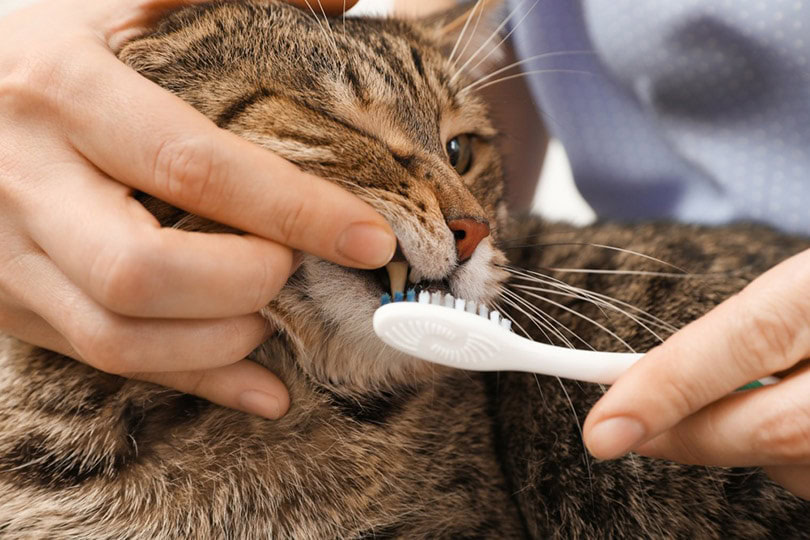
Additional Costs to Anticipate
Keep in mind that you may be charged for services other than dental cleaning. If your cat’s teeth are in fairly good shape, you can probably get away with only paying the cleaning fee. However, this isn’t always the way things happen, and you might have to pay more if the damage is worse than expected.
Anesthesia and Sedatives
Pet teeth cleaning is always performed under anesthesia. This not only ensures the safety of the patient and the professionals, but also enables airway protection to ensure water or debris doesn’t reach the cat’s respiratory system. Anesthesia is usually included in the initial estimate for teeth cleaning, but you should always ask ahead of time and expect to pay anywhere from $100 to $300 if it’s not included.
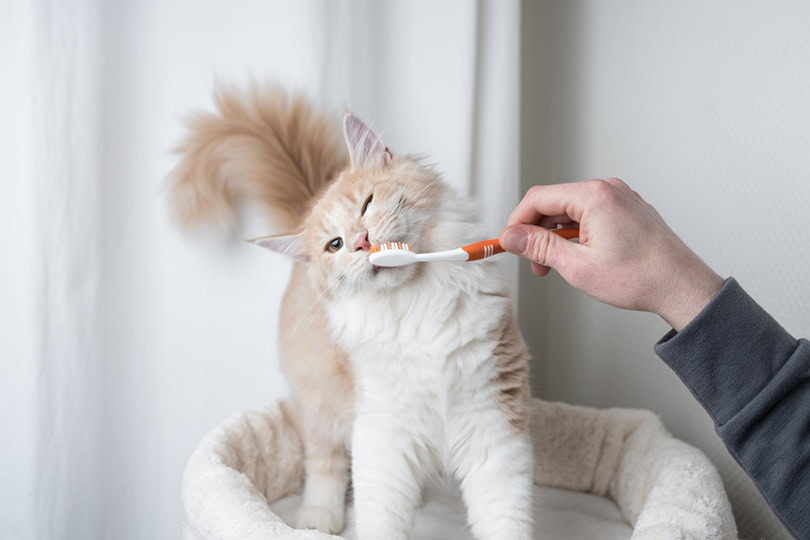
X-rays
Some vets will order an X-ray before the teeth cleaning to assess the teeth’s roots. X-rays are not cheap. Most cost between $100 and $300.
Special Treatments
Poor dental health in cats could lead to bacterial infections or abscesses that require antibiotics to heal. Expect to pay $50 to $100 for the medication.
How Often Should I Clean My Cat’s Teeth?
We get that trying to hold your cat and brush their teeth is not something that you’re likely looking forward to. Even though it can be a hassle, you should try to brush your cat’s teeth with a toothbrush, ideally once a day. If that seems impossible, then shoot for at least three times a week. Perfection isn’t required, but consistency is key for good feline dental health.
Professional cleanings don’t need to happen nearly as often. Your vet will let you know when it’s needed, since there’s no fixed frequency that works for all cats. Professional dental cleaning for your feline friend is sometimes needed once a year. Your vet has access to special tools that scrape off the tougher plaque and tartar that a toothbrush isn’t always capable of removing.
Does Pet Insurance Cover Feline Teeth Cleanings?
Whether or not your pet insurance covers feline teeth cleanings is dependent on the company and your policy. There has been an increase in vet care awareness that has encouraged many insurance companies to include dental cleanings in their plans. Ultimately, it just depends on the provider.
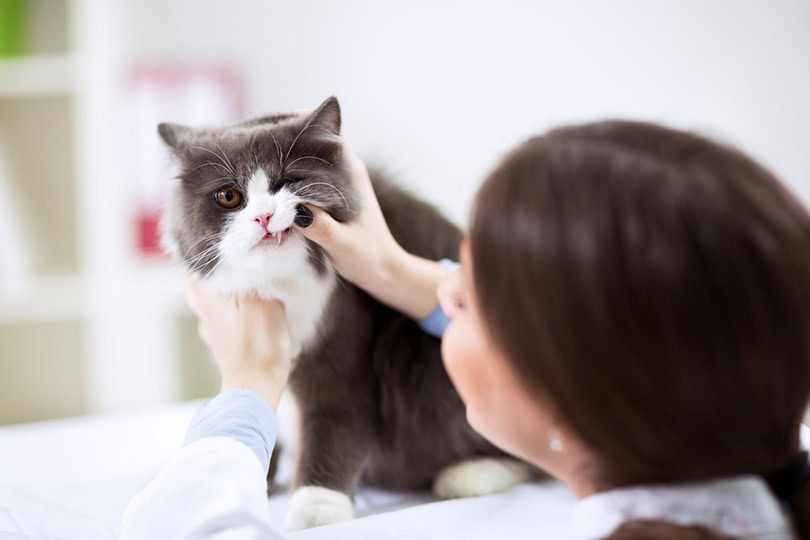
What to Do for Your Cat’s Teeth Between Professional Cleanings
Maintaining your cat’s dental hygiene at home is an important part of their overall health care. While some cats may be hesitant at first, many can learn to tolerate, if not accept, having their teeth cleaned with patience and consistent, gentle handling. Ideally, introducing dental care early in life helps them become more comfortable with the process. Brushing with a cat-specific toothbrush and toothpaste remains the most effective way to remove plaque. However, if your cat isn’t yet comfortable with brushing, there are alternatives. You can start by using your finger to gently massage their teeth and gums, gradually building up to a toothbrush as they become more accustomed to it.
Additionally, dental chews, dry kibble formulated for oral health, and dental gels or water additives can support your efforts between professional cleanings. For personalized recommendations and guidance, don’t hesitate to speak to a vet.
Conclusion
While dental care may not be your cat’s favorite activity, maintaining good oral hygiene is essential for their overall health and well-being. Establishing a daily dental routine—whether through brushing, dental treats, or other vet-recommended methods—can help prevent serious issues down the line and reduce the need for costly treatments.
A little effort now can go a long way to support your cat’s comfort and quality of life. With patience and consistency, dental care can become a manageable part of your routine and a key step toward keeping your cat healthier and happier for years to come.
Featured Image Credit: Pixel-Shot, Pixabay
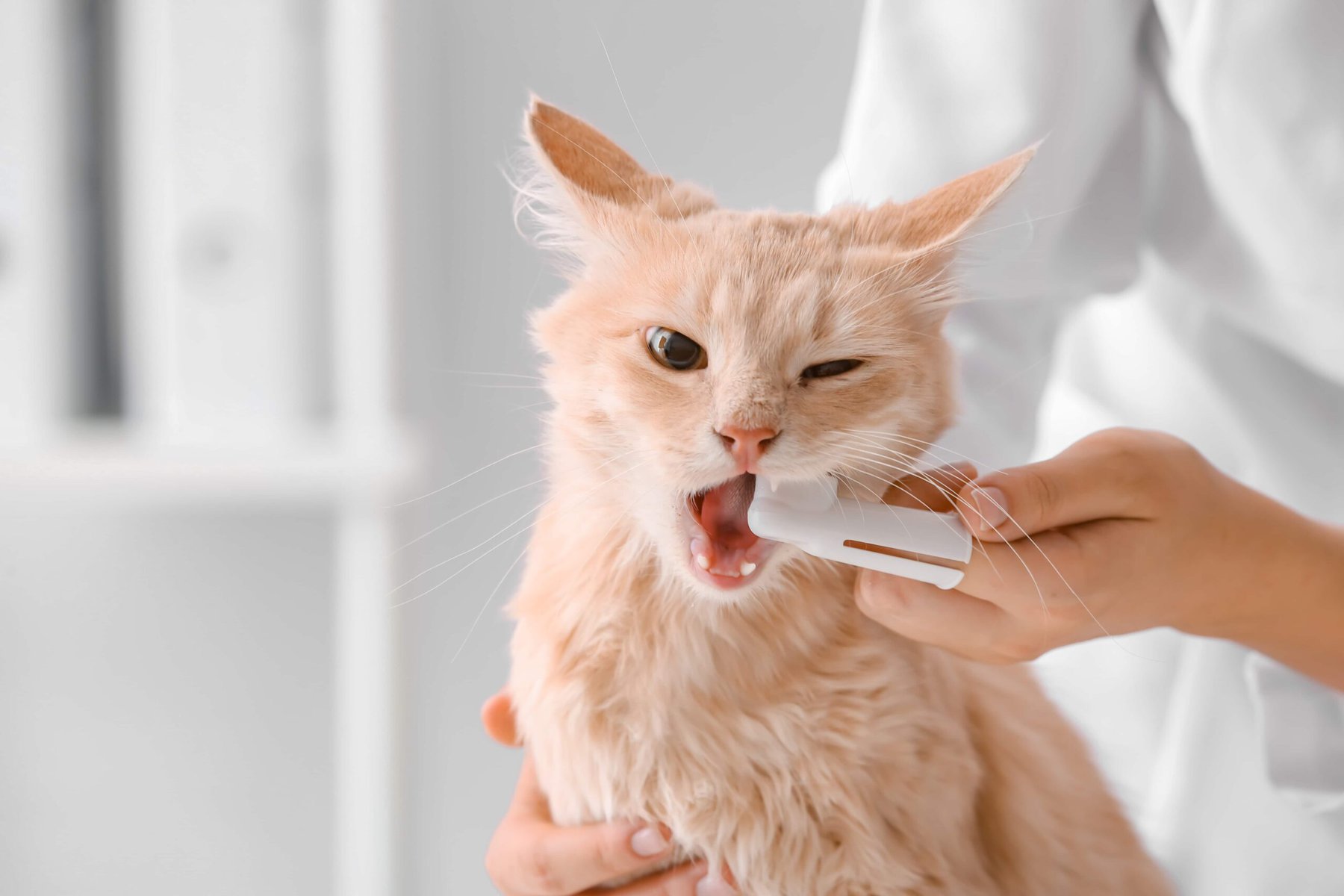








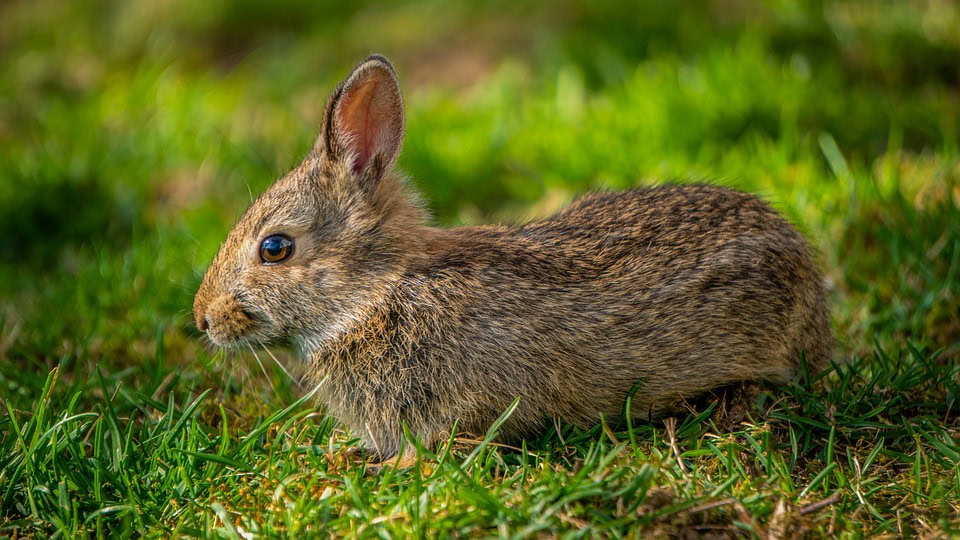
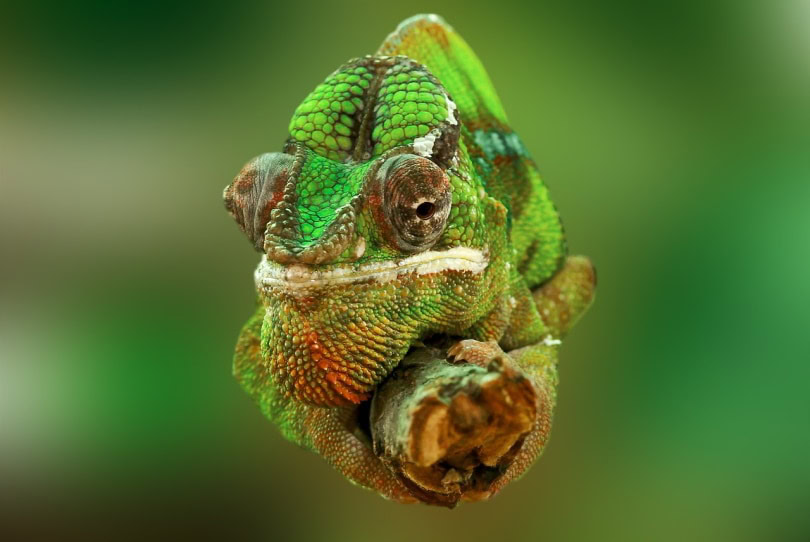
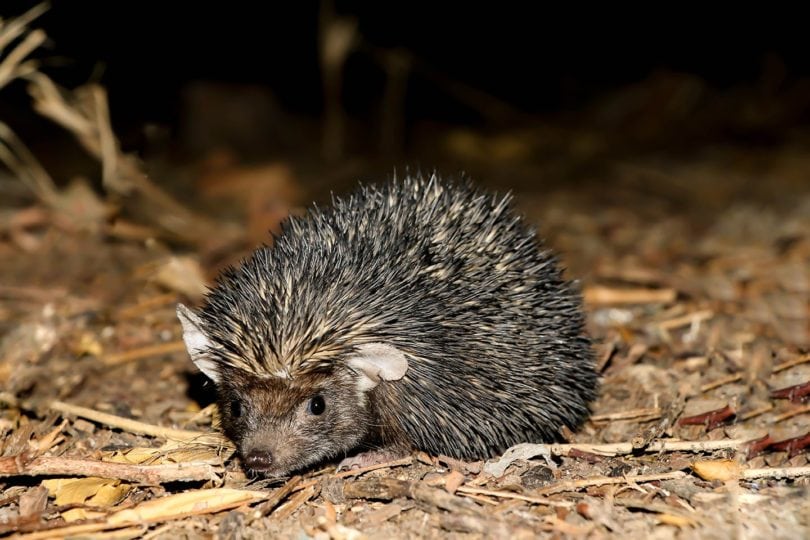



2 Responses
My 13 year old cat has redness of gums and vet gave estimate of $2000+ for cleaning, x-rays. You mention antibiotics. is it possible to have cleaning and antibiotics vs extraction?
Hello Nyla,
Thank you for your question. Unfortunately, you need to do the full treatment, including the extraction, if the vet recommends it. This procedure is only recommended when absolutely necessary to allow healing. If you would like to know more and get more detailed explanation about this, we can offer you an online consultation with one of our vets at PangoVet.com. We agree this procedure is expensive but the price seems to be about right.
After extraction, the vet will also prescribe antibiotics and anti-inflammatories plus pain medication.
Hope this helps.